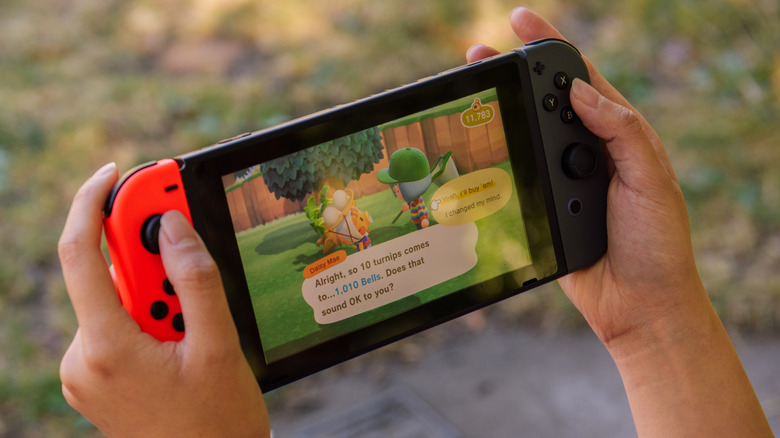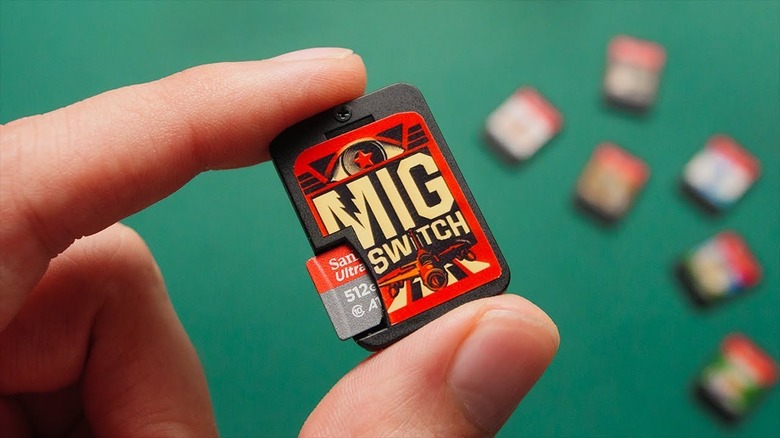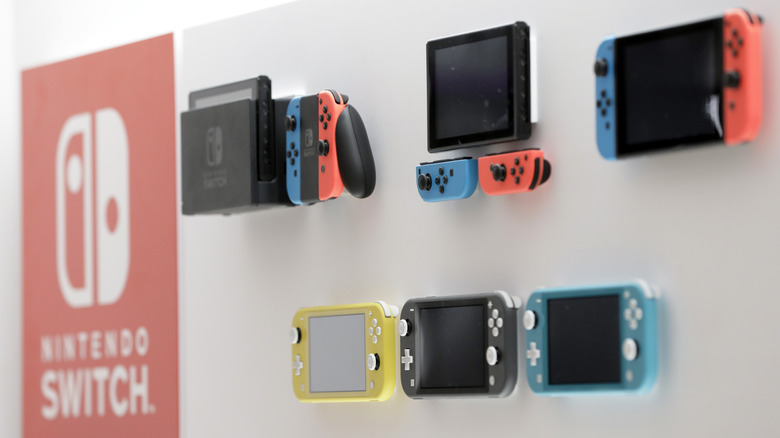Will Nintendo Ban You For Using MIG-Switch? Here's What We Know
At the end of 2023, the gaming world was hit by some very interesting news: Some mysterious, enterprising geeks and businesspeople had successfully developed the MIG-Switch, a flash cartridge (or "flash cart") for the Nintendo Switch. Flash carts are generally game cartridges with microSD card slots that allow homebrew software and ROM images of games to be played on original, unmodified hardware regardless of firmware revision. They had been a significant part of the ecosystem of Nintendo's handheld consoles going back to the Game Boy Advance, but it took almost seven years for someone to figure out how to get one to work on the Switch.
Officially speaking, the MIG-Switch is marketed as a device to allow gamers to play homebrew software and backups of their legally purchased cartridges, with its mysterious manufacturer selling its own backup device to facilitate the latter. In practice, though, there are always going to be people who use flash carts to play downloaded ROMs, and the specifics of the switch complicate that behavior. Specifically, each Switch cartridge has a unique security certificate, meaning that, in theory, it would be trivial for Nintendo to notice a certificate being reused and potentially ban gamers from the Nintendo Switch Online service for playing illicitly downloaded ROMs.
Is this a realistic concern? Is it one that only applies to those downloading ROMs dumped by other people? Or could it be a problem that could somehow extend to MIG-Switch users who are only running homebrew software and/or their own personal backups? Read on to learn what we know about these potential bans so far.
What we know so far
It's probably worth acknowledging that there's a big knowledge gap here. This flavor of Switch homebrew is so new that it's not as if there's any kind of sophisticated analysis into the security features of the console as of yet. We don't know what detection methods Nintendo has in place concerning repeat certificates. It would have to be lenient enough to allow selling cartridges and letting friends borrow them, so if there was such a barrier in place, it would most likely involve trying to detect multiple instances of the same certificate running at once.
However, there's reason to believe that, with the right care being taken, there's nothing to worry about. YouTuber J.P. of Alien Retro Gaming discovered in mid-January that you can rename any certificate to match a different game and it will work. In theory, this means that you could mix and match the certificate of a cartridge you own with internet-sourced ROMs and avoid detection. But we don't know that. J.P. also added that while online play technically works with the MIG-Switch right now, there's no reason to think Nintendo won't find a way to change that before long, like being able to detect mismatched certificates.
But what about false positives?
There's also the issue of how Nintendo could have to worry about unjust bans. YouTuber Taki Udon, who got a review unit of the MIG-Switch, provided one obvious example: Someone might dump a game, upload the ROM online, and trade in the cartridge, or similarly dump a cartridge obtained from a rental service or public library. This could create a problem where someone is legally using an original cartridge and gets banned because it was used to dump a commonly circulated ROM.
What this all means is that as things sit right now, it's hard to say where any of this stands and we probably won't have any idea what Nintendo is looking for until the console maker starts banning MIG-Switch users. With the bans would come attempts to find patterns in the bans. Even in the modding community, what exactly Nintendo does to try to detect mod chips, illicit ROMs, and the like is far from clear. We just know that Nintendo does a lot of careful analysis of Switch usage logs to try to find user behavior that goes against their rules to try to determine who to ban.
Until there's a better understanding of what exactly the Switch telemetry is looking for, though, it's a whole lot of guesswork.


